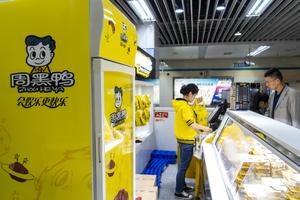 In this undated file photo, a mother and her daughter pass a Bestore outlet in Wuhan, Hubei province. (PHOTO BY SUN XINMING / FOR CHINA DAILY)
In this undated file photo, a mother and her daughter pass a Bestore outlet in Wuhan, Hubei province. (PHOTO BY SUN XINMING / FOR CHINA DAILY)
Burgers and fries, milk teas, chicken skewers, barbecued victuals and malatang-a spicy Sichuan broth with meat and vegetables-are currently the five most popular snacks ordered online by office employees in China.
The list is based on data from online food delivery platform Ele.me, which surveyed staff members who returned to work after the worst of the COVID-19 pandemic. In fact, leisure foods and drinks are being seen as daily necessities for a growing number of office workers. The ready-made snacks and beverages provide a convenient at-desk energy boost during a busy workday.
Among white-collar office staff in Chinese cities, 24 percent of respondents said they don't buy snacks while working, 53 percent said they spend less than 100 yuan (US$15.3) per month and the remainder spend more than 100 yuan per month, according to a recent survey by recruiting website 51job.
"White-collar office employees constitute a major higher-end consumer group of leisure foods. Grabbing business opportunities emerging from office settings can help retailers bring in considerable revenue," said Zhu Danpeng, a food industry analyst.
Guangxi Zhuang autonomous region-inspired luosifen, pungent rice noodles containing pickled bamboo shoots and river snails, has become a hot workplace commodity.
China's snack market has been growing rapidly, and offices serve as an important venue for consumption of snacks. With increasing homogenization of products, snack retailers need to create their core competencies with differentiated advantages.
Zhu Danpeng, food industry analyst
Nanjing, Jiangsu province; Guilin, Guangxi; Xiamen, Fujian province; Changsha, Hunan province, and Beijing have seen particularly brisk business for luosifen since office staff moved on from the work-from-home period, especially after COVID-19 began to come under control in China, according to Ele.me.
Since the outbreak of the pandemic, more than 50 percent of respondents regard such snacks as godsends. For people who still work from home, about 70 percent of respondents recognize the important function of snacks, and they consider snacks as something to help nourish bodies and minds during difficult times, according to a report by multinational confectionery company Mondelez International.
ALSO READ: Snack firms, retailers banking on Spring Festival for more growth
"Snacks refer to between-meal nibbles people consume during slower periods to help relax. They cover a wide range of foods such as baked goods, candies, biscuits and nuts," said Neil Wang, president of consultancy Frost & Sullivan China.
"With the increase in per capita income and the consumption upgrade trend in the country, Chinese consumers are buying more snacks. Yet, compared with developed markets such as Europe, the United States, Japan and South Korea, per capita consumption value and volume of leisure foods in China are relatively low, and there is still room for improvement," Wang said.
China's popular milk tea chain Heytea, a brand originating in Guangdong province, said the period between 2 pm and 4 pm on business days is its peak period for online orders. Heytea also gets more orders on Thursdays and Fridays, the company found.
Ordering beverages during afternoon tea breaks has become a daily routine for many office workers. As the weekend approaches, consumers seem to be more in need of getting to the finish line with a refreshing drink, Heytea said.
Zhouheiya International Holdings Co Ltd, a Wuhan, Hubei province-based snack food chain, has been a supplier of vacuum-packed cooked and marinated duck and related products.
 In this undated file photo, a customer checks snack products at a Zhouheiya store in Shanghai. (PHOTO PROVIDED TO CHINA DAILY)
In this undated file photo, a customer checks snack products at a Zhouheiya store in Shanghai. (PHOTO PROVIDED TO CHINA DAILY)
Late last year, the company introduced marinated duck gift boxed products, and the phrase in Chinese for receiving the bird became synonymous with wishing one a job promotion and salary rise. Bearers of such succulent gifts hope to cheer up anxious young office employees or college graduates, often quarantined at home, who were looking for new jobs and a way out of the isolation.
The product was jointly launched by Zhaopin, a Beijing-based online recruitment platform, and it has become a hot commodity by young office staff.
Another Wuhan-based snack retailer Bestore Food Co Ltd, which generates most of its sales selling meat snacks, nuts, candies and pastries, once introduced a leisure food product called communication cookies.
Every cookie is engraved with different patterns, and people can choose customized words for recipients, giving the product a sense of social connectivity.
ALSO READ: Chinese frozen food industry gathers strength
Bestore said such cookies can help people better communicate face-to-face with each other at a time when most people are used to communicating online or by mobile phones.
"China's snack market has been growing rapidly, and offices serve as an important venue for consumption of snacks. With increasing homogenization of products, snack retailers need to create their core competencies with differentiated advantages," food industry analyst Zhu said.
"By launching some innovative products and co-branding with companies from different sectors, such snacks not only satisfy demand for differing tastes, but also satisfy emotional demands from consumers," Zhu said.
"Mid- and high-end snacks are expected to draw more consumers, and they will develop in more detailed segments and target buyers from different age groups having different tastes and functions," he said.
Major snack retailers in China saw booming sales growth last year. In 2020, Hunan-based snack maker Yanjin Shop Food Co Ltd recorded sales revenue of 1.96 billion yuan, jumping 39.99 percent year-on-year.
Last year, its net profit reached 277 million yuan, surging 101.11 percent. The Shenzhen-listed retailer has seen stable sales and profit growth since it went public in 2017. The company mainly sells tofu, dried beans, candied roasted seed nuts and potato chips. It also offers different products in different areas, based on local tastes.
Yanjin Shop sells most of its snacks in small packages, and consumers can take different kinds and weigh them altogether. This helps buyers choose more varieties of products at one time, and is beneficial for companies hoping to phase out categories that are less popular, according to a research report by Minsheng Securities.
Other major snack players also performed well last year. Anhui province-based Qiaqia Food Co Ltd, a major producer of roasted seeds and nuts, said its sales last year likely hit 5.29 billion yuan, up 9.35 percent year-on-year. In 2020, its net profit likely reached 790 million yuan, expanding 30.89 percent year-on-year, the company said.
READ MORE: Savoring a snack in quaint Quanzhou
This year, sales of leisure foods in China are expected to hit 1.16 trillion yuan, growing 3.2 percent over last year, according to consultancy iiMedia Research.


